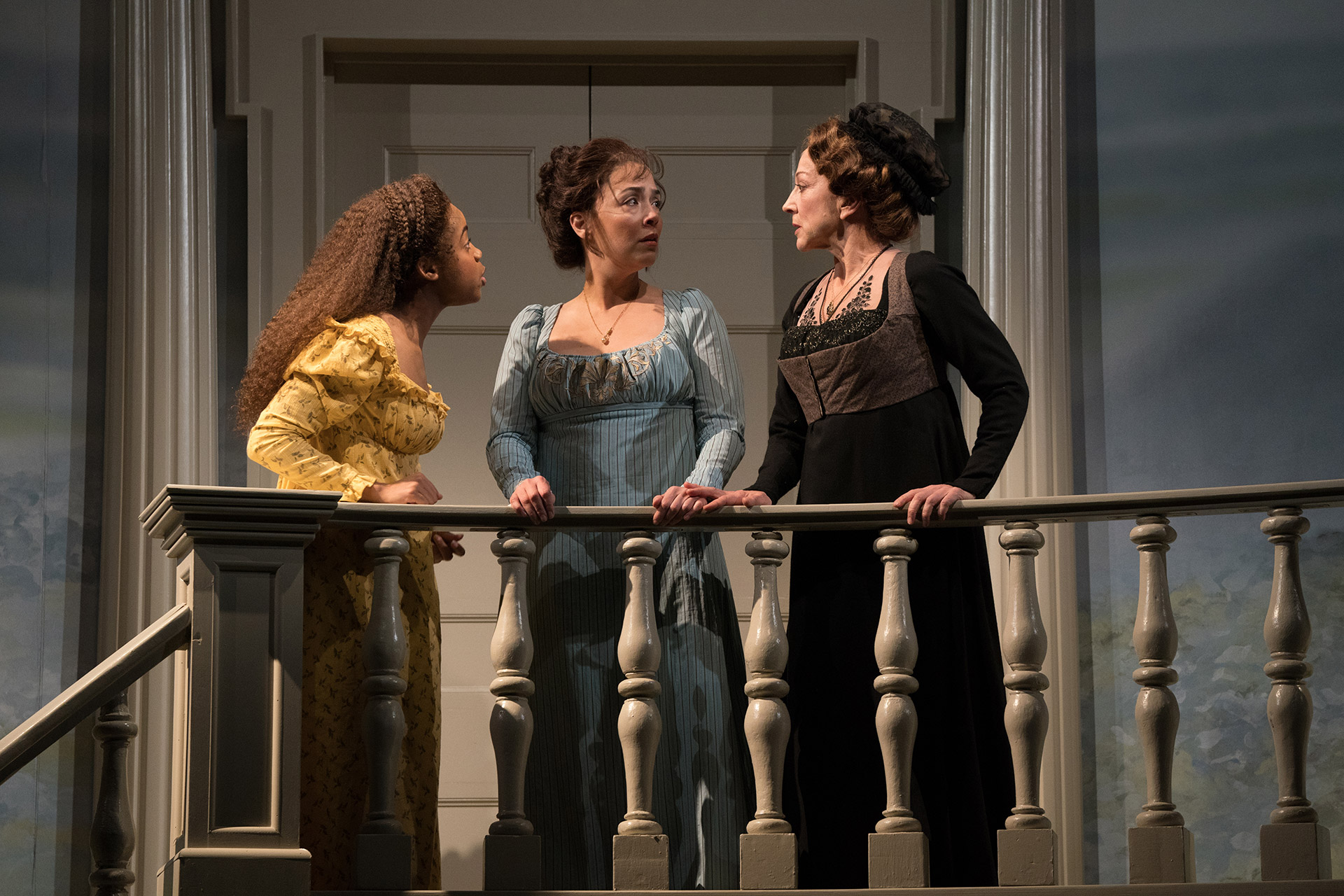 | |
| OSF photo by Jenny Graham |
The Oregon Shakespeare Festival has been making a concerted effort to move away from their pure Shakespeare roots and into other niches as well. About a decade ago they started adding a Broadway-style musical every season, and they have commissioned a number of new works, including their American Revolutions series.
In addition, they have been presenting adaptations of a classic novels or popular stories, probably to appeal to a slightly different literary crowd. This year's adaptation is Kate Hamill's adaptation of Jane Austen's classic novel, Sense and Sensibility.
Although I'm not a huge fan, I do appreciate Austen's writing, and at least one member of our group is a genuine Austen aficionado, so there was no way we were going to skip this show.
The Play
The adaptation is a pretty straightforward version of Austen's novel, though obviously trimmed to fit into just under two-and-a-half hours. We start with a brief glimpse of the Dashwoods' comfortable middle-class life before the father dies suddenly, leaving his entire estate to his son from a previous marriage. The son's wife convinces him that he doesn't have to live up to his promise to take care of his three half-sisters, leaving them quite impoverished and with little to offer potential suitors except their charm and wit.What follows is pretty typical Austen, with courtships and subtle (and not-so-subtle) flirtations, proposals, presumptions, and misunderstandings because everybody is so repressed about the whole thing. But things work out OK in the end, for the most part.
Although the play is an interesting look at 19th-century economic relations (and marriage was very much an economic association, in spite of the various infatuations and stylized Love that so preoccupy the girls), it's a little hard to take seriously in a modern era. There are certainly points that resonate with modern society, mostly about economic security and to a lesser extent, gender roles. But the plot devices are mostly about rather archaic social constructs that make little sense in the modern world.
The Production
After the previous evening's disappointment with Romeo and Juliet, it was refreshing to see a crisp, balanced production where the director (Hana Sharif) actually seems to have exerted some directorial control over the ensemble. Yes, K.T. Vogt and Brent Hinkley play their roles in a rather exaggerated, humorous vein, but they are clearly the comic relief and feel like appropriate diversions from the drudgery of the Dashwood family's difficulties. More importantly, they don't derail the main plot--those characters don't need credibility for later developments.And most refreshing was to see last night's Juliet, Emily Ota, playing a very convincing Marianne Dashwood. As the middle sister, it's hard to pin down her exact age, but in this role she definitely came across as much younger than her Juliet. Here she was a plausible late-teen, early-20s or so, which is just fine. Admittedly, the age spread among the three girls seemed rather vast. Nancy Rodriguez is perhaps a bit old to play Elinor, the oldest daughter, but she's a good enough actor to pull it off, and Samantha Miller was quite strong and truly girlish as both youngest daughter Margaret. This solidified my conclusion that the problem with R&J was not with the actors, but with direction.
Rounding out the cast were a number of the truly dependable Ashland company regulars, such as Kate Mulligan as Mrs. Dashwood and Kevin Kenerly as Colonel Brandon and Michael Hume as Sir John. Assembled in a set (designed by Collette Pollard) that cleverly evoked the period while still providing enough versatility to portray a variety of actual settings, and costumed in the usual brilliant work of the OSF costumers (designed by Fabio Toblini), the cast pulled together in a solid, convincing rendition of Austen's story.
Bottom Line
I liked this more than I thought I would. As you'll have noted above, I don't see any really huge overriding significance to this particular story in today's environment, but it's still a solid tale, adapted and presented very effectively. It's not a spectacular story or show, but still an impressive presentation overall, which is what I expect at Ashland.If anything, this presentation reassured me that the previous night's disappointment was an aberration, and that crazed actors have not taken control of the festival and ruined everything.
For the record, our Jan Austen fan liked the production very much. I liked it just fine, and would recommend it as a fine example of a stage adaptation of a period novel.
No comments:
Post a Comment